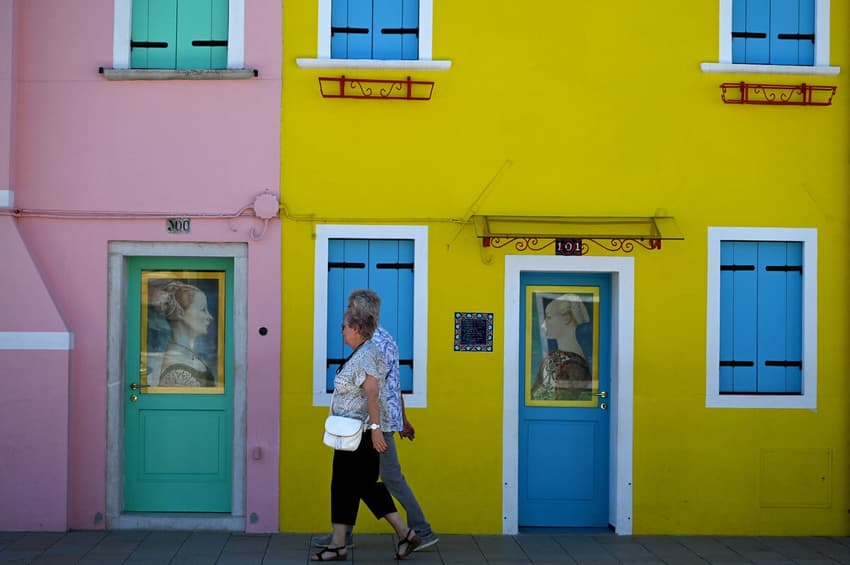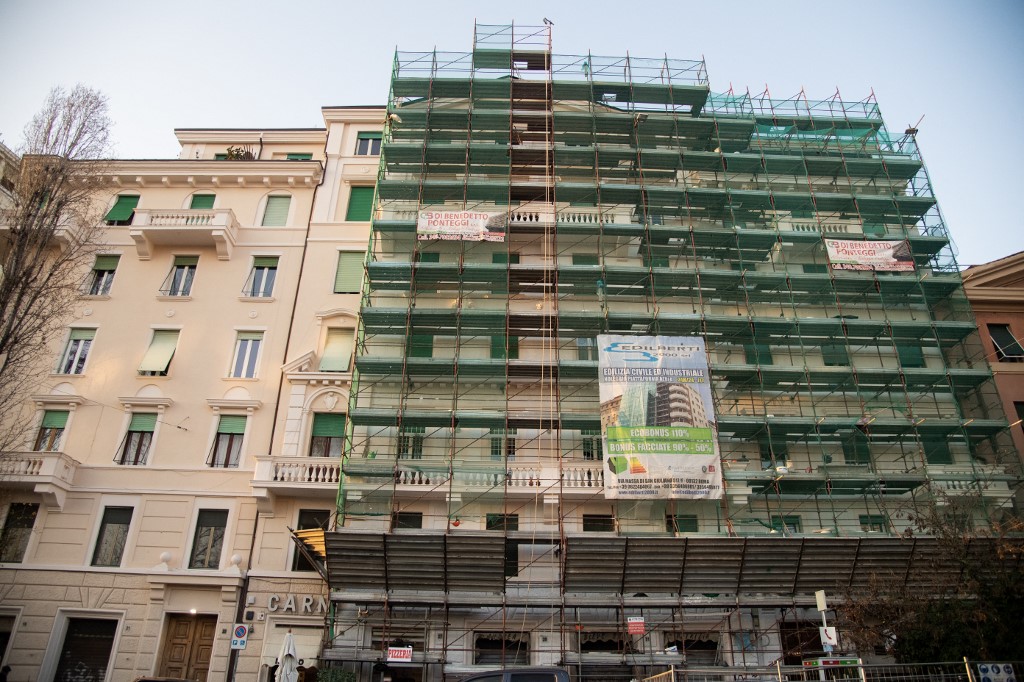What to expect from Italy's property market in 2024

From new rules for tourist lets to a reform of the popular ‘superbonus’ scheme, there are significant changes in store for homeowners in Italy next year.
Owning a house in Italy is a dream come true for many, but being a proprietario di casa brings with it a series of specific legal and financial obligations that are notoriously hard to navigate.
To further complicate things, property taxes and housing or renting regulations are for the most part subject to yearly changes, which can mean even the most attentive homeowners risk falling foul of the rules.
Next year will be no exception as the new Budget Law and a number of smaller ministerial decrees have already outlined some key changes affecting the property market (and homeowners’ finances) in 2024.
Property market overview
After experiencing steady growth in 2021 and 2022, the Italian property market slowed down significantly in 2023 amid soaring inflation and a steep rise in mortgage interest rates.
The number of mortgages granted in the first half of 2023 was down by nearly 30 percent compared to the same period in 2022, according to data from Italy's Consiglio Nazionale del Notariato (national council of notaries), whereas the latest study of the Italian market by Nomisma found that the overall number of real estate transactions was expected to register a final 13-percent year-on-year drop at the end of 2023.
The negative trend should continue into next year, according to the latest predictions – though property prices should generally remain stable in the face of a further drop in transactions.

A view of Florence's Piazza Santa Croce in February 2021. Photo by Vincenzo PINTO / AFP
As for mortgage rates, the cost of borrowing in 2024 will largely depend on inflation levels across Europe and the European Central Bank’s future monetary policy decisions.
In November, rates for a variable-rate loan stood at an average of six percent, whereas rates for a fixed-rate loan have now risen to around four percent, according to the latest data released by Italian banks on December 12th.
New national ID code for Airbnb rentals
Owners renting out their properties for short periods of time will be affected by two major changes in 2024, both part of a nationwide plan to combat tax evasion and curb tourist rentals amid a shortage of affordable housing in major Italian cities.
Under the Decreto Anticipi, which is expected to be made into law by the end of this week, it will be mandatory for all facilities offering short-term accommodation (this is defined as any rental period of 30 days or less in Italy) to have a national identification code (codice identificativo nazionale, or CIN) in 2024.
The CIN will have to be displayed on the accommodation website and in any online listing, including on platforms such as Airbnb, with fines of up to 5,000 euros for those flouting the rule.
A similar identification system is already in place as owners (or property managers) are currently supposed to hold a regional ID code (codice indentificativo regionale, CIR) and display it on all online listings.
But, partly owing to the absence of a national framework, the enforcement of these rules has so far been loose and inconsistent, which is why the present regional code system will be replaced by a national one next year.
Hike in flat tax on short-term rental income
As of January 1st 2024, the rate of Italy’s flat tax on short-term rental income (the so-called cedolare secca) will increase by five percentage points, that is from 21 to 26 percent, for owners renting out two or more houses.
According to estimates from Italian property managers association Aigab, the incoming hike should affect around 600,000 owners around the country, who can expect an average 850-euro tax increase a year.
READ ALSO: Which of Italy’s home renovation bonuses can you claim in 2024?
The rate will remain at 21 percent for owners renting only one house.
The cedolare secca is one of two ways property owners in Italy can declare and pay taxes on short-term rental income. The other one involves declaring any rental income as part of your overall income for the year and then paying Irpef (Italy’s main tax on individual income) on it.
Airbnb ban in Florence?
Florence may be the first Italian city to outright outlaw Airbnb rentals in 2024 after the city council preliminarily approved a ban on short-term lets within the historic centre amid a shortage of affordable long-term leases.
READ ALSO: Has Florence banned new Airbnb rentals in the city centre?
The final verdict on the subject is expected in May of next year, when Tuscany’s regional tribunal (TAR) will rule on the measure’s constitutionality.
Other major Italian cities, including Venice and Milan, have previously considered plans to restrict the number of short-term lets available in a bid to free up housing for residents – but there’s no sign of them becoming a reality just yet.
Changes to home renovation bonuses
All of Italy’s main home renovation incentives will still be in place in 2024 but some key changes are set to affect who’s able to claim them and how following major reforms from Giorgia Meloni’s government earlier this year.

The facade of a building in central Rome is shown as it undergoes renovation work in February 2023. Photo by Tiziana FABI / AFP
In particular, the maximum claimable amount under the well-known superbonus 110 scheme will go down to 70 percent of the total cost of work from January 1st 2024 after it dropped to 90 percent in 2023.
Further, barring some exceptions, the bonus will only apply to condominiums and small apartment buildings (two to four residential units) in 2024.
‘Capital gain tax’ on sale of superbonus buildings
Under Italy’s new Budget Law, homeowners choosing to sell a second home for which they claimed a superbonus discount within ten years from the end of the relevant renovation work will be required to pay a 26-percent tax on the capital gain (plusvalenza) resulting from the sale.
Superbonus-related expenses will not be considered as counting towards the profit made through sale.
READ ALSO: What’s happening with Italy’s building superbonus in 2024?
So, for instance, if a homeowner that bought a second home for 200,000 euros and carried out renovation works for 100,000 euros under the superbonus scheme sells the property for 400,000 euros, his taxable plusvalenza will be 200,000 (not 100,000).
No changes to Italy’s second-home property tax
While it seemed that a long-delayed reform of Italy's property tax on second homes – officially known as Imposta Municipale Unica (or IMU) – could come into effect in 2024, the plan has recently been postponed again.
This means that IMU’s legislative framework, including its current tax coefficients and payment deadlines, will remain the same until at least the end of 2024.
IMU is owed by all second-home owners in the country, but also applies to primary residences (prime case) in some rare cases.
Comments
See Also
Owning a house in Italy is a dream come true for many, but being a proprietario di casa brings with it a series of specific legal and financial obligations that are notoriously hard to navigate.
To further complicate things, property taxes and housing or renting regulations are for the most part subject to yearly changes, which can mean even the most attentive homeowners risk falling foul of the rules.
Next year will be no exception as the new Budget Law and a number of smaller ministerial decrees have already outlined some key changes affecting the property market (and homeowners’ finances) in 2024.
Property market overview
After experiencing steady growth in 2021 and 2022, the Italian property market slowed down significantly in 2023 amid soaring inflation and a steep rise in mortgage interest rates.
The number of mortgages granted in the first half of 2023 was down by nearly 30 percent compared to the same period in 2022, according to data from Italy's Consiglio Nazionale del Notariato (national council of notaries), whereas the latest study of the Italian market by Nomisma found that the overall number of real estate transactions was expected to register a final 13-percent year-on-year drop at the end of 2023.
The negative trend should continue into next year, according to the latest predictions – though property prices should generally remain stable in the face of a further drop in transactions.

As for mortgage rates, the cost of borrowing in 2024 will largely depend on inflation levels across Europe and the European Central Bank’s future monetary policy decisions.
In November, rates for a variable-rate loan stood at an average of six percent, whereas rates for a fixed-rate loan have now risen to around four percent, according to the latest data released by Italian banks on December 12th.
New national ID code for Airbnb rentals
Owners renting out their properties for short periods of time will be affected by two major changes in 2024, both part of a nationwide plan to combat tax evasion and curb tourist rentals amid a shortage of affordable housing in major Italian cities.
Under the Decreto Anticipi, which is expected to be made into law by the end of this week, it will be mandatory for all facilities offering short-term accommodation (this is defined as any rental period of 30 days or less in Italy) to have a national identification code (codice identificativo nazionale, or CIN) in 2024.
The CIN will have to be displayed on the accommodation website and in any online listing, including on platforms such as Airbnb, with fines of up to 5,000 euros for those flouting the rule.
A similar identification system is already in place as owners (or property managers) are currently supposed to hold a regional ID code (codice indentificativo regionale, CIR) and display it on all online listings.
But, partly owing to the absence of a national framework, the enforcement of these rules has so far been loose and inconsistent, which is why the present regional code system will be replaced by a national one next year.
Hike in flat tax on short-term rental income
As of January 1st 2024, the rate of Italy’s flat tax on short-term rental income (the so-called cedolare secca) will increase by five percentage points, that is from 21 to 26 percent, for owners renting out two or more houses.
According to estimates from Italian property managers association Aigab, the incoming hike should affect around 600,000 owners around the country, who can expect an average 850-euro tax increase a year.
READ ALSO: Which of Italy’s home renovation bonuses can you claim in 2024?
The rate will remain at 21 percent for owners renting only one house.
The cedolare secca is one of two ways property owners in Italy can declare and pay taxes on short-term rental income. The other one involves declaring any rental income as part of your overall income for the year and then paying Irpef (Italy’s main tax on individual income) on it.
Airbnb ban in Florence?
Florence may be the first Italian city to outright outlaw Airbnb rentals in 2024 after the city council preliminarily approved a ban on short-term lets within the historic centre amid a shortage of affordable long-term leases.
READ ALSO: Has Florence banned new Airbnb rentals in the city centre?
The final verdict on the subject is expected in May of next year, when Tuscany’s regional tribunal (TAR) will rule on the measure’s constitutionality.
Other major Italian cities, including Venice and Milan, have previously considered plans to restrict the number of short-term lets available in a bid to free up housing for residents – but there’s no sign of them becoming a reality just yet.
Changes to home renovation bonuses
All of Italy’s main home renovation incentives will still be in place in 2024 but some key changes are set to affect who’s able to claim them and how following major reforms from Giorgia Meloni’s government earlier this year.

In particular, the maximum claimable amount under the well-known superbonus 110 scheme will go down to 70 percent of the total cost of work from January 1st 2024 after it dropped to 90 percent in 2023.
Further, barring some exceptions, the bonus will only apply to condominiums and small apartment buildings (two to four residential units) in 2024.
‘Capital gain tax’ on sale of superbonus buildings
Under Italy’s new Budget Law, homeowners choosing to sell a second home for which they claimed a superbonus discount within ten years from the end of the relevant renovation work will be required to pay a 26-percent tax on the capital gain (plusvalenza) resulting from the sale.
Superbonus-related expenses will not be considered as counting towards the profit made through sale.
READ ALSO: What’s happening with Italy’s building superbonus in 2024?
So, for instance, if a homeowner that bought a second home for 200,000 euros and carried out renovation works for 100,000 euros under the superbonus scheme sells the property for 400,000 euros, his taxable plusvalenza will be 200,000 (not 100,000).
No changes to Italy’s second-home property tax
While it seemed that a long-delayed reform of Italy's property tax on second homes – officially known as Imposta Municipale Unica (or IMU) – could come into effect in 2024, the plan has recently been postponed again.
This means that IMU’s legislative framework, including its current tax coefficients and payment deadlines, will remain the same until at least the end of 2024.
IMU is owed by all second-home owners in the country, but also applies to primary residences (prime case) in some rare cases.
Join the conversation in our comments section below. Share your own views and experience and if you have a question or suggestion for our journalists then email us at [email protected].
Please keep comments civil, constructive and on topic – and make sure to read our terms of use before getting involved.
Please log in here to leave a comment.